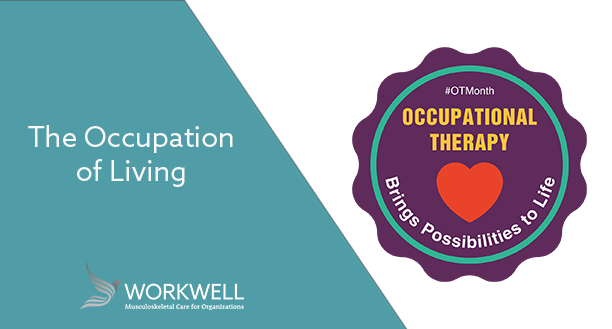Prevent It


The Occupation of Living
April is National Occupational Therapy month, so we thought it fitting to recognize the work that occupational therapists do in the area of work injury prevention and management.
I have been an occupational therapist for 31 years. For 31 years, people have asked me if I help people get jobs. The answer to that question is “no.” The word “occupation” simply refers to meaningful everyday activities and roles, which may include working at a job. While OTs don’t help people get jobs, they do help workers stay healthy and on the job. As licensed healthcare professionals, occupational therapists strive to help individuals achieve their optimal level of function when there has been a disruption in their ability to perform routine daily activities due to injury, illness, or disability. OTs work in a variety of settings, including industry.
So, while I have never helped people get employment, I have always aimed to help people feel safer and more comfortable doing their work. Through workplace wellness, job analysis, and ergonomics initiatives, I have had the opportunity to positively impact the lives of workers in both office and industrial settings. Here are a few ways occupational therapists or other healthcare professionals serve in a consultative role in a workplace setting to help keep workers healthy and working.
Education & Training
- Benefits of movement and physical activity
- Importance of microbreaking and posture changes
- Safe lifting techniques
- Avoiding awkward postures for safer work performance
Adaptation
- Strategies to change how a work task is performed
- Adjusting the position of a keyboard or computer monitor to ensure a neutral body position
- Enlarging the size of a tool handle to reduce the required grip force
- Adapting the activity, not the person performing the activity
Modification
- Make the work task different to make it safer
- Alter the physical environment to eliminate a lifting task or decrease the distance/height of a lift
- Change the size, shape, or dimensions of an object that needs to be manually handled
- Recommend changes to the work environment based on an understanding of the physical demands of the job.
Occupational therapists help people do the daily occupations they need and want to do. As part of WorkWell’s Managed Onsite MSK clinic programs, we identify the right resources for the employer site, whether it is a physical therapist, an occupational therapist, or an athletic trainer. Happy OT Month!
Select a topic
- View all topics
- WorkWell
- Safety Culture
- Onsite PT Clinics
- Ergonomics
- Injury/Illness Prevention
- Employee Wellness
- MSK
- POET
- Industry News
- Safety
- Managed Services
- Manufacturing
- FJD
- Functional Job Descriptions
- Onsite PT
- Post Offer Employment Training
- Provider Network
- Blog
- Events
- Featured
- OSHA
- Work Readiness
- Company News
- Job Coaching
- MSK Strategy
- Musculoskeletal
- PT Solutions Employee
- Presenteeism
- Push/Pull
- Recruitment
- Training
- Trust
- Worksite Rounds
Subscribe to Our Blog
Practical tips focused on workplace injury prevention.
Featured Posts
postsTags [BlogPost 199930206624 Why Fit Matters: Preventing Injuries Before Day One, BlogPost 196317046114 The Fork in the Road: Reacting vs. Preventing Workplace Injuries]
.png)
